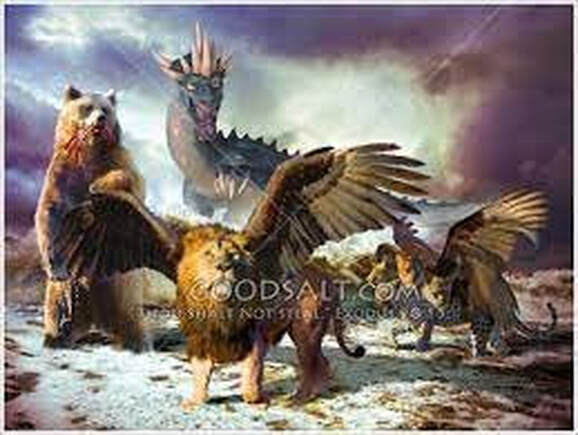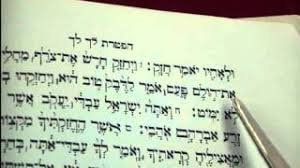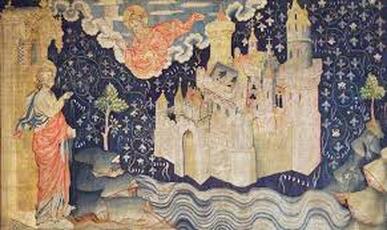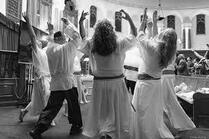The parasha introduced Abraham as "advanced in years." The haftarah introduces King David as "advanced in years." Though the CJB translation doesn't, the Hebrew uses the same wording for the phrase in both verses.
By now Avraham was old, advanced in years; and Adonai had blessed Avraham in everything.
(Gen 24:1 CJB)
King David grew old, the years took their toll, and he couldn't get warm even when they covered him with bedclothes. (1Ki 1:1 CJB)
Succession Battle, Adonijah Stages a Coup!
David was sickly, ready to die. This provoked a succession crisis which Adonijah, one of the sons of King David, exploited. Adonijah was handsome and thus easily won the hearts of some of the people. Taking advantage of his father's sickness and thus thinking that no one was looking, he gathered to himself a retinue to go before him. Joab, David's military commander and Abiathar, David's priests became part of this retinue.
Adoniyah the son of Haggit was beginning to claim that he would be king; to this end he organized chariots and horsemen, with fifty men to run ahead of him. (His father had never in his life confronted him by asking, "Why are you behaving this way?" Moreover, he was a very handsome man; he was born next after Avshalom.) He conferred with Yo'av the son of Tz'ruyah and Evyatar the cohen; and they both supported Adoniyah. (1Ki 1:5-7 CJB)
Some others did not fall for Adonijah's attempts to steal the throne by taking advantage of his father's illness, but stayed loyal to David, whom HaShem had chosen.
But Tzadok the cohen, B'nayah the son of Y'hoyada, Natan the prophet, Shim`i, Re`i and David's elite guard were not on Adoniyah's side. (1Ki 1:8 CJB)
Adonijah went through all the religious, legal, and public motions of a bona-fide coronation. He also knew who not to invite so as not to be challenged.
One day Adoniyah killed sheep, oxen and fattened calves at the Stone of Zochelet, by `Ein-Rogel. He summoned all his brothers the king's sons, and all the men of Y'hudah the king's servants; but he did not summon Natan the prophet, B'nayah, the elite guard or Shlomo his brother. (1Ki 1:9-10 CJB)
CONNECTIONS WITH PARASHA
The parasha this week also brings us to Abraham, advanced in years and having to deal with his inheritance and a legitimate successor between his 8 children. His main successor was Isaac, who received the custody of the covenant along with the Land of Canaan The others received "gifts" as their inheritance.
Since that time, the descendants of the other children of Abraham have been in a battle with Isaac 's descendants called "The Middle-East Conflict," which is nothing more than a sibling rivalry between brothers over Abraham's inheritance.
Abraham took another wife, whose name was Keturah. (2) She bore him Zimran, Jokshan, Medan, Midian, Ishbak, and Shuah. (3) Jokshan fathered Sheba and Dedan. The sons of Dedan were Asshurim, Letushim, and Leummim. (4) The sons of Midian were Ephah, Epher, Hanoch, Abida, and Eldaah. All these were the children of Keturah. (5) Abraham gave all he had to Isaac. (6) But to the sons of his concubines Abraham gave gifts, and while he was still living he sent them away from his son Isaac, eastward to the east country. (Gen 25:1-6 ESV)
BATHSHEBA (בת שבע, Daughter of the Oath) REMINDS DAVID, HER HUSBAND, OF HIS "OATH" TO HER
Natan went to Bat-Sheva the mother of Shlomo and said, "Haven't you heard that Adoniyah the son of Haggit has become king without the knowledge of David our lord? Now, come, please let me give you advice, so that you can save both your own life and that of your son Shlomo. Go, get in to see King David, and say to him, 'My lord, king, didn't you swear to your servant, "Your son Shlomo will be king after me; he will sit on my throne"? So why is Adoniyah king?' Right then, while you are still talking with the king, I will also come in after you and confirm what you are saying." Bat-Sheva went in to the king in his room. (The king was very old; Avishag the Shunamit was in attendance on the king.) Bat-Sheva bowed, prostrating herself to the king. The king asked, "What do you want?" She answered him, "My lord, you swore by Adonai your God to your servant, 'Your son Shlomo will be king after me; he will sit on my throne.' But now, here is Adoniyah ruling as king; and you, my lord the king, don't know anything about it. He has killed oxen, fattened calves and sheep in great numbers; and he has summoned all the sons of the king, Evyatar the cohen and Yo'av the commander of the army; but he didn't summon Shlomo your servant. (1Ki 1:11-19 CJB)
With the help of Nathan, the loyal prophet, Bathsheba pleads with the king to use his divine, God-given executive authority to rectify the situation in order to:
A: Fulfill the promise of the true heir of the kingdom
B: Avoid civil war
As for you, my lord the king, all Isra'el is watching you; they are waiting for you to tell them who is to sit on the throne of my lord the king after him. If you don't, then, when my lord the king sleeps with his ancestors, I and my son Shlomo will be considered criminals." Right then, while she was still talking with the king, Natan the prophet entered. They told the king, "Natan the prophet is here." After coming into the king's presence, he prostrated himself before the king with his face to the ground. Natan said, "My lord king, did you say, 'Adoniyah is to be king after me; he will sit on my throne'? For he has gone down today and killed oxen, fattened calves and sheep in great numbers; and he has summoned all the king's sons, the commanders of the army and Evyatar the cohen; right now they are eating and drinking in his presence and proclaiming, 'Long live King Adoniyah!' But he didn't summon me your servant, or Tzadok the cohen, or B'nayah the son of Y'hoyada or your servant Shlomo. Is this authorized by my lord the king without your having told your servant who would sit on the throne of my lord the king after him?" (1Ki 1:20-27 CJB)
A STORY PORTENT TO THE FUTURE OF CUSTODY OF THE ABRAHAMIC PROMISES
From the time that Abraham established Isaac as his sole inheritor (Gen 25:5-6), stealing custody of the Abrahamic promises by his siblings has become the backdrop behind history's wars over the ownership of Jerusalem, and indeed, of antisemitism itself.
The rulings concerning the dividing of Abraham's inheritance amplified by the conspiracy by Adonijah to illegitimately steal the Davidic throne are portent to Jerusalem's last 2000 years historical conquests by different empires. The history of Jerusalem will culminate at the end of times, with a ruler in Talmudic traditions referred to as "Armilus" (in Hebrew ארמלוס, a cryptogram derived from רמאלוס Romulus, one of the founders of Rome, according to legend) and in the Brit Chadasha, the "Anti-Christ" (in Hebrew שקר משיח or, the Counterfeit Messiah/anti-Christ). Click HERE for more info on Armilus.
According to Jewish tradition and early messianic writings, this counterfeit Messiah will establish himself as ruler of the world from the throne in Jerusalem, thus stealing that position from Yeshua himself, the only legitimate Abrahamic and Davidic King of Jerusalem by divine mandate, seven years before his coronation on the Jerusalem throne at then end of times.
But a branch will emerge from the trunk of Yishai, a shoot will grow from his roots. The Spirit of Adonai will rest on him, the Spirit of wisdom and understanding, the Spirit of counsel and power, the Spirit of knowledge and fearing Adonai --he will be inspired by fearing Adonai. He will not judge by what his eyes see or decide by what his ears hear, but he will judge the impoverished justly; he will decide fairly for the humble of the land. He will strike the land with a rod from his mouth and slay the wicked with a breath from his lips. (Isa 11:1-4 CJB)
But in connection with the coming of our Lord Yeshua the Messiah and our gathering together to meet him, we ask you, brothers, not to be easily shaken in your thinking or anxious because of a spirit or a spoken message or a letter supposedly from us claiming that the Day of the Lord has already come. Don't let anyone deceive you in any way. For the Day will not come until after the Apostasy has come and the man who separates himself from Torah has been revealed, the one destined for doom. He will oppose himself to everything that people call a god or make an object of worship; he will put himself above them all, so that he will sit in the Temple of God and proclaim that he himself is God. Don't you remember that when I was still with you, I used to tell you these things? And now you know what is restraining, so that he may be revealed in his own time. For already this separating from Torah is at work secretly, but it will be secretly only until he who is restraining is out of the way. Then the one who embodies separation from Torah will be revealed, the one whom the Lord Yeshua will slay with the breath of his mouth and destroy by the glory of his coming. When this man who avoids Torah comes, the Adversary will give him the power to work all kinds of false miracles, signs and wonders. He will enable him to deceive, in all kinds of wicked ways, those who are headed for destruction because they would not receive the love of the truth that could have saved them. This is why God is causing them to go astray, so that they will believe the Lie. The result will be that all who have not believed the truth, but have taken their pleasure in wickedness, will be condemned. (2Th 2:1-12 CJB)
The HaftaraH continues by telling us how King David foiled the conspiracy and set his legitimate successor upon his throne in Jerusalem: Solomon.
WHAT DO WE LEARN FROM THIS STORY?
This story is a detailed foreshadow of end time events. Indeed, the messianic story culminates with HaShem setting His own legitimate king, Yeshua, on the Jerusalem throne, to rule with a rod of iron over the world from Jerusalem, but not before a counterfeit Messiah called the Anti-Christ tries to steal that throne while "nobody's looking," or so he thinks.
History has been plagued with would-be messiahs and prophets. Gamaliel makes mention of some to Saul in his days. Our contemporary times are no exceptions.
But one of the members of the Sanhedrin rose to his feet, a Parush named Gamli'el, a teacher of the Torah highly respected by all the people. He ordered the men put outside for a little while and then addressed the court: "Men of Isra'el, take care what you do to these people. Some time ago, there was a rebellion under Todah, who claimed to be somebody special; and a number of men, maybe four hundred, rallied behind him. But upon his being put to death, his whole following was broken up and came to nothing. After this, Y'hudah HaG'lili led another uprising, back at the time of the enrollment for the Roman tax; and he got some people to defect to him. But he was killed, and all his followers were scattered. (Act 5:34-37)
So just as it was important for the Jewish people of Yeshua's day to properly vet any pretense of messiahship, it is important we do so in our days.
DIAGNOSTICS OF AN ANTICHRIST
The word "Antichrist" means counterfeit Messiah. To be effective, a "good" counterfeit has to be able to deceive; he therefore has to bear the marks of the original.
"At that time, if someone says to you, 'Look! Here's the Messiah!' or, 'There he is!' don't believe him. For there will appear false Messiahs and false prophets performing great miracles — amazing things! — so as to fool even the chosen, if possible. There! I have told you in advance! (Mat 24:23-25)
If HaSatan came to us with hooves and pitchforks in red pajamas, we would easily identify him. That is why he has often been identified as a wolf in sheep's clothing. That is exactly what we are talking about when broach the subject of the Antichrist. He is the wolf trying to appear as the Lamb of God.
An example of a bad counterfeit would be the wolf in the Little Red Riding Hood story. He could put on the clothes and get in the bed of the grandmother, but didn't do a good job at hiding his long nose and ears. Innocent Red Riding Hood knew something was wrong and she questioned the long-eared and long-nosed grandmother. The thing is that as soon as she smelled the rat (or the wolf), she should have turned back and called for the wood chopper. Red Riding Hood may have been harmless as a dove, but she was not as wise as a serpent, as we are mandated to be.
This rabbi's idea of the final Anti-Messiah is that he will be one who will deceive with his words and pretend to be for the right things, even the things of God, as he tries to deceive the most important people on earth who could and should expose him: God's people, the disciples of Yeshua.
It is important, then, for those who have the mandate of establishing the Kingdom of God on earth as it is in Heaven, through the teaching of the Word, to be able to ask the right questions to that wolf in grandmother's clothing. They should be able to right away discern the long ears and long nose. And indeed, they will be as evident as a nose on the face if, and only IF, they themselves have the right idea of what the Messiah of Israel looks and acts like. But if they have an erroneous idea of what the Messiah is to look and act like, THEY WILL be deceived.
Indeed, we do have a description in the Brit Chadasha of an antichrist who tries to appear similar to our Messiah. In his revelation on the Isle of Patmos, Yochnanan sees the Antichrist, not only as he who will rule the world, but he who has ruled it from long ago. Then Yochanan gives a description of his "media/mage manager" also called the false prophet. Just as Elijah/John announced Messiah, the false prophet announces the antichrist.
Then I saw another beast coming up out of the earth. It had two horns like those of a lamb, but it spoke like a dragon (A WOLF IN SHEEPS CLOTHING (PS 55:21). It exercises all the authority of the first beast in its presence; and it makes the earth and its inhabitants worship the first beast, the one whose fatal wound had been healed ("FATAL WOUND HEALED?: IMITATING RESURRECTION!). It performs great miracles (LIKE YESHUA), even causing fire to come down from heaven onto the earth as people watch (LIKE THE PROPHETS OF GOD/ELIJAH). It deceives the people living on earth by the miracles it is allowed to perform in the presence of the beast, and it tells them to make an image honoring the beast that was struck by the sword but came alive again. It was allowed to put breath into the image of the beast (IMITATING GOD AT CREATION), so that the image of the beast could even speak; and it was allowed to cause anyone who would not worship the image of the beast to be put to death. Also it forces everyone — great and small, rich and poor, free and slave — to receive a mark on his right hand or on his forehead (LIKE TEPHILINS) preventing anyone from buying or selling unless he has the mark, that is, the name of the beast or the number of its name. This is where wisdom is needed; those who understand should count the number of the beast, for it is the number of a person, and its number is 666. (Rev 13:11-18)
DIAGNOSTICS OF THE MESSIAH
Beware of Opportunists
The Jews of Israel in the days of Yeshua wanted the Messiah to come to deliver them from Roman oppression. This gave rise to many trying to exploit this hunger for deliverance to their own glory.
Identification Signs
John mentions that the changing of the water into wine was the beginning of Yeshua's signs. Since it seems that other miracles happened before, some scholars suggest that John is drawing from an older written source listing miracles that would identify a would-be messiah. Some therefore suggest that this is what John means when he identifies certain miracles as proof that Yeshua is the Messiah. I will present to you the primary proofs. Other listings and arrangements are possible, but the idea remains that these were messianic identifications that could not be performed by anyone else. Many also smack of Moses; miracles for the Children of Israel in the desert.
- Changing the water into wine at Cana. John 2:1-11
- Healing the official's son at distance. John 4:43-54
- The healing at the Pool of Bethesda. John 5:1-15
- The feeding of the 5000. John 6:1-15
- Walking on water. John 6:16-21
- Healing of the man born blind. John 9:1-12
- Resurrection. John 20
Lineage and Character
In Yeshua's day also, a would-be be Messiah would have to come from the line of Judah and from the household of David, thus the genealogies in the Gospel texts. That is why the Messiah is referred to in Jewish texts as "The Son of David". This is because of 2 main prophecies. One from Jacob and one from Nathan the prophet.
Just as the Israelites of old had to be careful about someone stealing the crown of Messiah in their days, so do we in our days.
What are therefore signs of a legitimate Messiah. I cannot enumerate them all but here are some. Along with all the aforementioned signs, the Messiah:
- Must be from the lineage of David/Judah
- Must come from the clouds. Acts 1:11
- Must carry the marks of the crucifixion. John 20:24-28
- Live by the tenets of the Torah. Is 53:11
- Exercise justice. Is 11:3-5
Someone like Moshe
Deuteronomy tells us that the coming Messiah/Prophet should be like Moshe (Deut 18:15). This means that:
- He should be a Jew
- He should have direct communication with HaShem (Num 12:6-8)
- His ministry and style should be similar to Moshe (Teacher/prophet/legislator).
It is important to notice that Jewish history contains many details about Moshe's birth that are very similar to that of Yeshua's. The Messiah is one who according to the tenets of the Torah cares for the meek, the poor, the disenfranchised, the stranger...Anyone who acts like a proud, arrogant, and conceited ravenous wolf while claiming godliness acts more like an anti-messiah, the likes of which were already numerous in the days of John.
Finally, Paul warned Timothy that:
In the acharit-hayamim will come trying times. People will be:
self-loving,
money-loving,
proud,
arrogant,
insulting,
disobedient to parents,
(THAT ONE GOES FOR ADULTS TOO!
ungrateful,
unholy,
heartless,
unappeasable,
slanderous,
uncontrolled,
brutal,
hateful of good,
traitorous,
headstrong,
swollen with conceit,
loving pleasure rather than God,
as they retain the outer form of religion but deny its power.
Stay away from these people!
(2Ti 3:1-5)
V)
And the king swore, saying, “As the LORD lives, who has redeemed my soul out of every adversity, (1Ki 1:29 ESV)
as I swore to you by the LORD, the God of Israel, saying, ‘Solomon your son shall reign after me, and he shall sit on my throne in my place,’ even so will I do this day.” (1Ki 1:30 ESV)
Then Bathsheba bowed with her face to the ground and paid homage to the king and said, “May my lord King David live forever!” (1Ki 1:31 ESV)
AMEN!
MAY WE DISCERN THE TRUE AND RIGHTFUL KING OF ISRAEL.
LIKE RED RIDING HOOD,
MAY WE SEE THE WOLF IN GRANDMOTHER'S DISGUISE.
MAY WE KNOW TO ASK THE RIGHT QUESTIONS.
MAY HASHEM GIVE US ALL DISCERNMENT AND FLEE FROM THE IMPORTER!!!
Then King David answered, “Call Bathsheba to me.” So she came into the king's presence and stood before the king. (1Ki 1:28 ESV)
R' GABRIEL LUMBROSO





 RSS Feed
RSS Feed